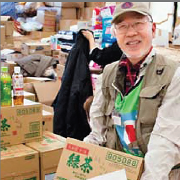Japan (MNN) ― The Japanese government has lifted the "stay-home" order around the Fukushima Dai-ichi area.
That means residents can stop being ready to evacuate, and--once cleanup is finished--schools and other public services can function again. Business is getting back to "normal," but after the quake, tsunami, and nuclear disasters, what's defined as "normal?"
International Aid CEO Brian Anderson says as they supported the local church through the emergency phase, they were beginning to see a new picture emerging of what "normal"might look like. "Because the government is truly focused on infrastructure, it does create an opportunity on the personal level for the Christian community to make some inroads with the people and to be able to share the Gospel."
Prior to March 11, 2011, Christians weren't ready to respond to a disaster. "The Christian community there is represented by less than 1% of the total population. There really is a need there to hear the Gospel."
Since then, it's been quite a different story. Anderson explains, "We had an opportunity, early on, to provide two vehicles to an organization called CRASH Japan. CRASH stands for Christian Relief, Assistance, Support and Hope, which allowed them to move people and supplies."
CRASH Japan got people organized and has since sent out over 1600 volunteers to serve both the physical and spiritual needs of survivors. In partnership with local churches, CRASH Japan has planned and accomplished many programs to serve the needs of disaster-affected areas. For example, "Koriyama has a lot of temporary housing that was put up.
Koriyama Christ Church is delivering food to these residents, and at the same time, having an opportunity to share the Gospel."
Koriyama quickly became a settlement area as temporary housing units sprang up all over. "A number of these housing units lack both heat and air conditioning. There are gaps along the roof line."
Many who were displaced hoped that they would be able to return home quickly. As the weeks drag on into months, there's another issue believers are facing. "Coming into winter, there's a real concern about the lack of hope. They really are dreading a spike in the suicide rate there as well."
Anderson says International Aid provided thousands of dollars of medications, hygiene products, blankets and flashlights to be given to those who were injured or lost their homes. They also addressed the human dignity problem.
"We had the opportunity to provide 25 starter kits made up of home furnishings and items for use in the temporary housing to make those units more livable."
More than programs, the impact made through these relationships will play a key role in spreading the hope of Christ throughout Japan in the future.
However, church partners are tired. What can you do? "Pray for the church partners. They've been at this since March. [Pray] for strength and endurance. You can see that there's weariness on their part because there's a lot of effort, and it goes on week after week. Coming into the winter months, I think that their workload is going to increase."

No comments:
Post a Comment